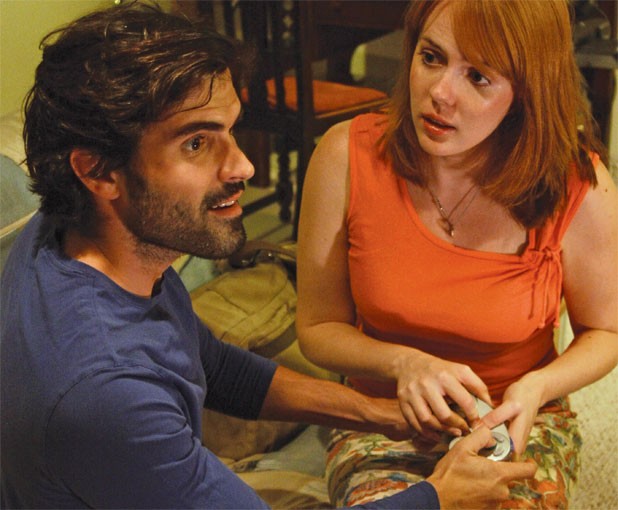
- Krys Mateo, left, and Aaron Ballard
U.S. combat operations in Iraq officially “end” on September 1. While politicos and pundits publicly debate the war’s next euphemistically named phase (“Operation New Dawn”), many of the 1.7 million veterans of Iraq and Afghanistan have been waging private battles since returning home. When a new report reveals shocking stats on suicide or post-traumatic stress disorder among vets, media attention focuses on their struggles for a news cycle or two and then fades.
These numbing statistics overwhelm us with the problem’s magnitude while depersonalizing the anguish of individuals. In Game Over, playwright Josh Levine deftly takes away the anesthetic of unfathomable numbers. His intimate character study focuses on the relationships of three close friends, two of whom have just come back from Iraq. All three actors in Red Stage Theatre’s current production render lively, compassionate portraits of the conflicted characters.
Through the prism of this trio, the one-act play asks a simple question: Does the war actually end for young soldiers when they return to civilian life? All three high school pals are now in their mid-twenties. Best buds Jimmy and Marcus served together in Iraq. Marcus’ longtime sweetheart, Carla, works as an aide at their alma mater.
Marcus has been glued to his girlfriend’s sofa for the two weeks since he got out of the army. He plays a violent, Nazi-hunting video game virtually 24/7. Carla can’t get him to engage in anything else: conversation, a night out with friends, minimal personal hygiene, even sex.
Jimmy has been home for five months, one injured eye covered by a patch. He works at his father’s furniture store — not his dream job — and occasionally dons his desert fatigues to talk at their old high school about his time overseas. He’s eager to return to military duty as soon as his wound heals.
Carla is impressed by how well Jimmy seems to be coping and urges him to give couch-bound Marcus a pep talk. Jimmy reluctantly agrees, but the conversation between comrades becomes a confrontation. Bitterness pulses beneath Jimmy’s confident façade. Things that happened in Iraq fractured their friendship. Jimmy blames Marcus for his injury, because Marcus failed to avoid the fateful roadside IED when they were out together on patrol.
As Carla continues to talk with each man about his war experiences, she risks learning too much. In some ways, she represents the American public. We all support the troops ... right? We want to help; we want to let vets unburden themselves. And yet there are awful details that Carla, and the rest of us, just can’t bear to know.
Playwright Levine is still a grad student, and Game Over is just emerging from the workshopping process, according to Red Stage co-artistic director Kohler McKenzie. Although the story’s straightforwardness gives it power, there are times when “simple” verges on “simplistic.” When Carla tells Marcus that Jimmy’s injury is not his fault, the Red Bull-swilling, insomniac agoraphobe almost instantly transforms into Normal Boyfriend again. Overall, however, Levine crafts sensitive characters with whom we connect easily. He makes us think and confront issues that we’d rather avoid.
As Jimmy, Nick Abeel gives rich texture to the soldier’s many layers of emotion. Abeel gradually reveals what Jimmy is concealing under the veneer of balance and bonhomie: frustration, rage, even racism. Smiling, sweet-cheeked, gentlemanly Jimmy later turns scowling, vulgar and violent.
Marcus tries to use humor to overcome his fear. Krys Mateo capitalizes on this to make the character genuinely charming, even as an unshowered, uncommunicative couch potato. Rattled nerves get the best of Marcus at first, however. A loud explosion on the video game sends the ex-soldier diving for cover — in Carla’s living room. His eyes, initially deadened and TV-transfixed, come back to life as Marcus works to uncouple himself from war’s madness and rejoin the world.
Aaron Ballard gives a thoughtful, nuanced performance as Carla. The GI’s girlfriend has endured years of separation while he was deployed. Ballard’s calm, accepting manner shows how Carla strives to remain patient and understanding. But baggage from the war tests the limits of her selflessness and serenity.
Innovative elements of Jessie Vacchiano’s sound and lighting design help bring the set to life. In the high school cafeteria, Carla has to shush murmuring kids who won’t shut up; an unseen TV’s disturbing bluish glow illuminates game-addled Marcus. Sound emerges from speakers in different parts of the house. While this adds impressive dimension to the audio design, music and effects occasionally drown out quieter passages of speech. The Black Box’s dialogue-eating acoustics remain difficult to overcome.
This is Red Stage’s second summer in Burlington. Game Over fits well with the company’s aim, which McKenzie says is to present “theater that still asks questions [and] awakens the soul.” Mission accomplished; Levine’s show is both thought provoking and emotionally engaging. Friday’s opening night was poorly attended, however; the enthusiastic crowd of two dozen or so seemed to consist primarily of supportive family and friends.
Tune out the drone of war news if you must. But don’t turn away from an absorbing play, where insight aplenty remains.









Comments
Comments are closed.
From 2014-2020, Seven Days allowed readers to comment on all stories posted on our website. While we've appreciated the suggestions and insights, right now Seven Days is prioritizing our core mission — producing high-quality, responsible local journalism — over moderating online debates between readers.
To criticize, correct or praise our reporting, please send us a letter to the editor or send us a tip. We’ll check it out and report the results.
Online comments may return when we have better tech tools for managing them. Thanks for reading.